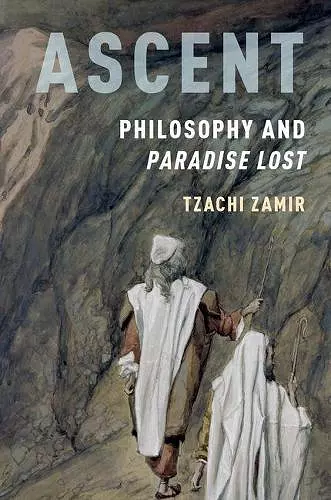Ascent
Philosophy and Paradise Lost
Format:Hardback
Publisher:Oxford University Press Inc
Published:4th Jan '18
Currently unavailable, and unfortunately no date known when it will be back

Paradise Lost has never received a substantial, book-length reading by a philosopher. This, however should surprise no one, for Milton himself despised philosophers. He associated philosophy with deceit in his theological writings, and made philosophizing into one of the activities of fallen angels in hell. Yet, in this book, philosopher and literary critic Tzachi Zamir argues that Milton's disdain for their vocation should not prevent philosophers from turning an inquisitive eye to Paradise Lost. Because Milton's greatest poem conducts a multilayered examination of puzzles that intrigue philosophers, instead of neatly breaking from philosophy, it maintains a penetrating rapport with it. Paradise Lost sets forth bold claims regarding the meaning of genuine knowledge, or acting meaningfully, or taking in the world fully, or successfully withdrawing from inner deadness. Other topics touched upon by Milton involve some of the most central issues within the philosophy of religion: the relationship between reason and belief, the uniqueness of religious poetry, the meaning of gratitude, and the special role of the imagination in faith. This tension-disparaging philosophy on the one hand, but taking up much of what philosophers hope to understand on the other-turns Milton's poem into an exceptionally potent work for a philosopher of literature. Ascent is a philosophical reading of the poem that attempts to keep audible Milton's anti-philosophy stance. The picture of interdisciplinarity that emerges is, accordingly, neither one of a happy percolation among fields ('philosophy', 'literature'), nor one of rigid boundaries. Overlap and partial agreement clash against contestation and rivalry. It is these conflicting currents which Ascent aims to capture, if not to reconcile.
There is much else we may be stimulated to find by thinking through this fine addition to Milton scholarship. * Maximilian de Gaynesford, British Journal of Aesthetics *
Zamir's analysis proves that philosophical approaches to the gift can enliven and deepen readings of Paradise Lost. * Patrick J. Mcgrath, Milton Quarterly *
fine addition to Milton scholarship. * Maximilian de Gaynesford, BJA *
This year's group of Milton books undoubtedly peaks, however, with Tzachi Zamir's marvellous and mindexpanding Ascent: Philosophy and Paradise Lost * Catherine Bates, Studies in English Literature *
the book invites active readership and thoughtful response. Because it does so, it should interest not only scholars of seventeenth-century literature and philosophers, but also any readers interested in the religious imagination and its critiques. * Elizabeth Skerpan-Wheeler, Renaissance Quarterly *
Frank, honest, and stimulating * Joe Moshenska, Mind *
There is no doubt that Zamir has succeeded eminently and entirely in capturing the scope and structure of Milton's ambition, and, in doing so, in making modes of enhanced, better articulated self-consciousness available, for Milton scholars, Christian theologians, and Philosophers alike. * Richard Elridge, Swarthmore College *
Over and above the specific achievements of his account of his account, I found particularly refreshing Zamir's foregrounding of the question: what does it mean to relate to something that one stands absolutely outside? * Joe Moshenkska, University of Oxford *
Zamir's subtle, nuanced interpretation of Paradise Lost provides rich insight into the nature and characterization of the Father, the Son, Adam, Eve, and Satan. ... The book will reward any reader with an interest in Paradise Lost, Milton's theodicy, or the intersection of religion, philosophy, and literature. Zamir's writing is marvellously clear and will be accessible to students at all levels. ... Highly recommended. * B. E. Brandt, Choice *
In Double Vision: Moral Philosophy and Shakespearean Drama, Tzachi Zamir demonstrated what can be done when an acute philosopher and subtle literary critic turns his attention to a great writer. Now he has done the same with Milton in Ascent: Philosophy and 'Paradise Lost'. In a book essential for anyone interested in the intersections of literature, philosophy, and religion, Zamir offers a generous and empathetic reading of claims for religious poetry that his own philosophical commitments in part preclude. In deeply illuminating chapters on gratitude in Paradise Lost, Zamir demonstrates that Milton's poem contains a gift theory more nuanced even than Jacques Derrida's or Jean-Luc Marion's. * Stephen M. Fallon, John J Cavanaugh Professor of the Humanities, University of Notre Dame *
A refreshing departure from the usual concerns of Miltonic studies, this book offers a searching meditation on the ethics of Paradise Lost. Zamir finds in Milton's epic an implicit critique of the limitations of philosophy, indeed an exemplary signposting of those moments at which literary modes of understanding transcend the merely philosophical. * Christopher Tilmouth, University of Cambridge *
This book brings to bear on its topic the learning and insights both of philosophy and of literary criticism. It is a sensitive and thoughtful exploration of Milton's poetry and philosophical theology. Both those who are interested in understanding the power of Milton's poetry and those who share with Milton an interest in philosophical theology will find this book helpful. * Eleonore Stump, Robert J. Henle Professor of Philosophy, Saint Louis University *
ISBN: 9780190695088
Dimensions: 142mm x 211mm x 23mm
Weight: 340g
216 pages